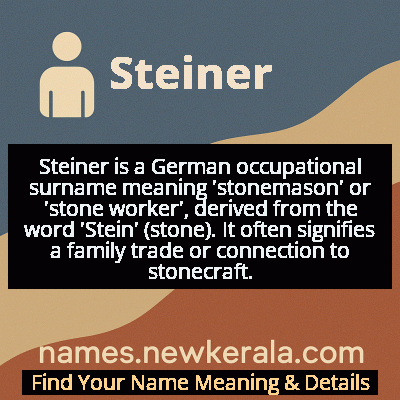Steiner Name Meaning & Details
Origin, Popularity, Numerology Analysis & Name Meaning of Steiner
Discover the origin, meaning, and cultural significance of the name STEINER. Delve into its historical roots and explore the lasting impact it has had on communities and traditions.
Name
Steiner
Gender
Male
Origin
German
Lucky Number
9
Meaning of the Name - Steiner
Steiner is a German occupational surname meaning 'stonemason' or 'stone worker', derived from the word 'Stein' (stone). It often signifies a family trade or connection to stonecraft.
Steiner - Complete Numerology Analysis
Your Numerology Number
Based on Pythagorean Numerology System
Ruling Planet
Mars
Positive Nature
Generous, passionate, energetic, and humanitarian.
Negative Traits
Impulsive, impatient, moody, and can be overly emotional.
Lucky Colours
Red, maroon, scarlet.
Lucky Days
Tuesday.
Lucky Stones
Red coral, garnet.
Harmony Numbers
1, 2, 3, 6.
Best Suited Professions
Military, sports, philanthropy, leadership roles.
What People Like About You
Courage, energy, leadership, generosity.
Famous People Named Steiner
Rudolf Steiner
Philosopher and Educator
Founded anthroposophy and Waldorf education system
Maximilian Steiner
Film Composer
Academy Award-winning composer for 'The Sting' and 'The Way We Were'
John Steiner
Actor
British character actor known for roles in 'The Devils' and 'Caligula'
George Steiner
Literary Critic
Influential literary critic and philosopher at Cambridge and Geneva
Name Variations & International Equivalents
Click on blue names to explore their detailed meanings. Gray names with will be available soon.
Cultural & Historical Significance
The name carries echoes of Germany's rich architectural heritage, from Romanesque churches to Gothic cathedrals, where skilled stone workers were essential craftsmen. During the 19th century, many Steiner families emigrated to America, where the name became associated with various trades and professions while maintaining its German cultural identity. The occupational origin of the name provides insight into medieval social structures, where one's surname often directly reflected their role in the community and contributed to family identity across generations.
Extended Personality Analysis
Individuals bearing the name Steiner are often perceived as possessing qualities metaphorically linked to stone - stability, reliability, and endurance. They tend to be practical, grounded people who approach life with a methodical, building-block mentality. Like stone masons carefully placing each stone, Steiners are known for their patience and attention to detail in both personal and professional endeavors. Their inherent stability makes them excellent in crisis situations, where they provide the solid foundation others can rely upon.
Steiners typically exhibit strong work ethics and take pride in creating things of lasting value, whether in relationships, careers, or creative projects. They may be somewhat reserved initially, but like well-cut stone, reveal their true character and strength over time. Their practical nature is balanced by a deep appreciation for craftsmanship and quality, often excelling in fields requiring precision and long-term vision. While sometimes perceived as stubborn or inflexible, this quality often reflects their commitment to principles and standards rather than mere obstinacy.
Modern Usage & Popularity
In contemporary times, Steiner remains primarily a surname rather than a given name, though it occasionally appears as a first name, particularly in German-speaking countries and among families with German heritage. The name maintains moderate popularity in Germany, Austria, and Switzerland, while also being well-established in the United States due to German immigration waves throughout the 19th and early 20th centuries. According to surname distribution data, Steiner ranks among the top 500 most common surnames in Germany and appears frequently in American demographic records, particularly in states with significant German-American populations like Pennsylvania, Wisconsin, and Texas. The name has seen a slight resurgence in recent years, possibly influenced by the growing interest in heritage names and the continued popularity of Waldorf education founded by Rudolf Steiner. In professional contexts, individuals named Steiner are often found in fields requiring precision and craftsmanship, continuing the occupational legacy of their name's origin while also branching into diverse modern professions.
Symbolic & Spiritual Meanings
Symbolically, Steiner represents permanence, foundation, and transformation through craftsmanship. Like stone itself, the name embodies the concept of enduring strength through time - the bedrock upon which structures, families, and institutions are built. It symbolizes the alchemical process of transforming raw materials into something beautiful and functional, mirroring how stonemasons turn rough stone into architectural marvels that withstand centuries. The name also carries connotations of wisdom and historical continuity, as stone formations record geological history much like human experience accumulates over a lifetime. In metaphorical terms, Steiner suggests someone who can weather storms unchanged at their core, yet flexible enough to be shaped by experience and relationships. The symbolic meaning extends to concepts of legacy and permanence - creating things meant to last generations, whether physical structures, intellectual contributions, or family traditions that become the foundation for future growth and development.

